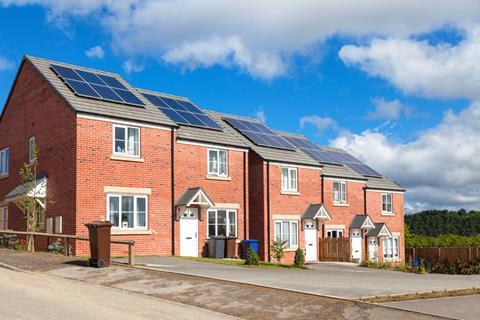UK Finance says government needs total ’policy reset’ to deliver Net Zero homes commitment
UK banks and mortgage lenders have called on the government to slash stamp duty for purchasers of energy efficient homes as part of a major policy reset to deliver on the £300bn challenge to make homes Net Zero.
The industry body covering the financial sector, UK Finance, today launched a report calling for a significant change in direction from government in order to deliver on its promises, including grants for vulnerable homeowners and the setting up of a delivery body to co-ordinate a retrofit programme.
The report follows significant criticism of the government over its retrofit strategy, following the abandoning of the short-lived Green Homes Grant scheme in 2021 and disappointment over the content of the long-awaited Heat and Buildings Strategy, published this time last year.

Significantly, UK Finance put its weight behind proposals drawn up by the Energy Efficiency Infrastructure Group (EEIG) to redesign Stamp Duty in order to incentivise homeowners to buy energy efficient homes and undertake efficiency upgrades.
David Postings, chief executive of UK Finance, said: “The challenge we face means we can no longer just consider our options, but instead need to see strong action. In housing this means addressing the impact of heating the UK’s 28 million homes.
“In order to make real progress everyone must work together, led by clear, decisive and supportive government action.”
The Stamp Duty proposals, which would be designed to be revenue neutral, would see buyers pay reduced stamp duty on more energy efficient homes – a move likely to benefit developers of new build properties – while buyers of less energy efficient stock would pay more. However, purchasers who undertake work to upgrade their home within two years of buying the home would be eligible for a stamp duty rebate, equivalent to the new rating that their home achieves subsequent to the work carried out.
UK Finance said it had carried out the report because its members were committed to investing in assets – in this case homes – which delivered against their own net zero commitments, but they required a policy environment which was likely to actually deliver this. The body said the government needed to undertake a “strategic reset” of its policies in order to deliver net zero homes, which it said was the “number one policy issue facing future generations”.
In addition to the stamp duty changes, it called for:
- Grants covering the full cost of energy efficiency measures up front for the poorest households, and grants covering partial costs for other households
- The formation of a “government-led delivery body” to oversee the retrofit effort and “drive collaboration and knowledge sharing between key stakeholders”. The body should be operational by 2024
- Creation of a “Retrofit Advisory Service” to help homeowners decide what measures they need to install, plus training and policy certainty to allow SMEs and the supply chain to upskill
- Expansion of the existing £800m Social Housing Decarbonisation Fund
- Government to consider mandating installation of “hydrogen-ready” boilers where heat pumps not being used
UK Finance said statistics showed that the UK had the least efficient homes in Europe, responsible for 14% of carbon emissions, and estimated that it will cost £300bn to retrofit the existing stock to a Net Zero standard.
In June this year the UK Climate Change Committee said that the government efforts to improve energy efficiency in buildings remained “well below the necessary level”, while in July the High Court ruled that the government Net Zero Strategy, of which the Heat and Buildings Strategy forms a major part is not sufficiently detailed to meet the government’s obligations to provide detailed plans under the Climate Change Act.
UK Finance’s report said upgrading UK homes will require a “monumental retrofitting effort”, and that the “scale and cost of changes needed to UK homes means that grants are unavoidable.”
Louise Hutchins, head of policy and public affairs at the UK Green Building Council, which supported the (EEIG) in drawing up the Stamp Duty plan, said UK Finance was “absolutely right” to call for the ramping up of action to make homes net zero.
She said: “Despite the UK’s homes being one of the largest barriers to achieving a net zero economy, homeowners aren’t incentivised to insulate their loft and walls, or install double glazing or a heat pump.
“UKGBC has long advocated for an energy saving stamp duty incentive that rewards households for improving the energy efficiency of their homes. A long-term structural incentive would make energy efficient homes cheaper to buy and poorer-performing ones less attractive to purchasers. Properly designed, a stamp duty incentive would embed energy efficiency into the decision-making process of homebuyers and be revenue neutral for the government.”
The Department for Business, Energy and Industrial Strategy, which leads on the Net Zero Strategy, has been contacted for comment.










No comments yet